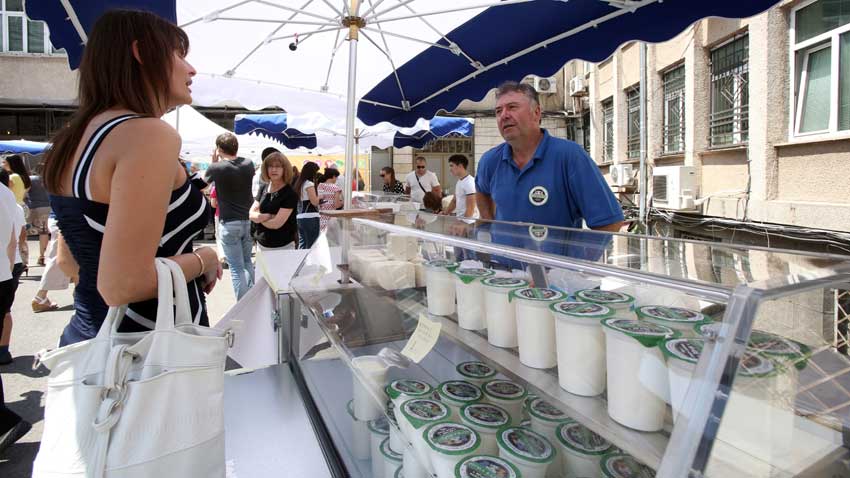Honey obtained aromatic mountain herbs, pure fresh milk from free range animals, jam made of aromatic fragrant forest fruit – this is what citizens and guests of Sofia can buy, and on weekdays at that. Farmers who have been working under a Bulgarian-Swiss project named For the Balkan and the People displayed their organic products in the yard of the Ministry of Agriculture and Food in Bulgaria’s capital. Life in Bulgaria can be tasty, celebrated Bulgarian chef Uti Bachvarov, who cooked a giant organic kebap near the stands of the organic producers, contends. Here is the recipe:
“I use 100 kilograms of tender Bulgarian beef, 100 bunches of spring onions and 100 bunches of fresh parsley. I also brought several kilos of real mountain thyme, which makes the dish taste incredible. I travel a lot across Bulgaria with my friends and I learnt that every region has its subtleties when it comes to cooking. I learnt from the people who live in the Rhodopes that when a given meal is delicious it always contains butter. That is why I used butter in my organic kebap.”
Few urban people still remember the taste of the real yoghurt. However, it turned out that the taste of this traditional Bulgarian product can be problem.
“The shops are still cautious with our product, because people have already forgotten the real natural taste", farmer Hristo Vassilev from the village of Nefela (Vratsa district) told Radio Bulgaria. "They are used to eating products made of powdered milk which can stay in the refrigerator for up to three months. Our milk, however, lasts for ten days only.”

The young Bulgarian farmer said that he came across a series of difficulties during the manufacture, the processing and the sale of his cow milk yoghurt. In his words, middlemen buy the fresh milk for 12-13 Eurocents per liter only, whereas its prime cost amounts to 40 Eurocents. Besides, stock-breeders are forced to sell their produce in their district and in one more neighboring district only. Thus, Hristo Vassilev does not have access to big markets such as Sofia, Plovdiv and the big coastal cities. He can not sell at the European markets where the interest towards organic food has been constantly growing.
Maya Angelova who opened a small factory for forest fruit jams in the village of Prevala near Chiprovtsi also suffers from the abovementioned restrictions and sells her produce mainly to farmer’s markets and small shops. “We would never get access to the big retail stores in Bulgaria”, Maya says. Although organic products are very healthy and are of excellent quality, they appear very rarely on the Bulgarian table, because they are more expensive than the largely used food products.
“The organic honey is more expensive, because the yield is lower", bee-keeper Tsvyatko Nachev from the town of Kalofer specifies. "Our job is specific and we do not treat the bees with any chemicals whatsoever. We only use lavender and mint oil.”
Can urban citizens get into the habit to use more organic products? In Chef Uti Bachvarov’s view, the number of small dairy shops which sell such food has been on the rise, but unfortunately some sellers are not honest with their clients.
“I would like to tell all people with small businesses that they can easily lose the confidence of the client. That is why they must keep good reputation and sell real produce. When we go abroad it is always nice to see small shops selling several, yet real products only. Perhaps, this is the big lesson we should learn, because there are people in this country who produce real organic food and we must help them sell their produce. Sincerity is what matters the most in this business”, Uti Bachvarov concludes.
English version: Kostadin Atanasov
Photos: BTAKonyovets village near Shumen is marking 160 years since the oldest stud farm in Bulgaria was set up. Celebrations are being organized on the farm on 1 November when officials from the Ministry of Agriculture and Food and of the State Fund..
The Professional Association of Robotics, Automation and Innovation s unites over 80 Bulgarian and international companies that have one global objective - to establish our country as a center for technology development . To achieve this dream,..
The votes in the early parliamentary elections on October 27 outlined an even more diverse parliament. The initial forecasts were for a 9-party National Assembly, but the results that the CEC announced after processing all the..
The traditional Bulgarian Christmas picnic, organized by the Bulgarian Cultural and Social Association "Rodina - Sydney" and the Bulgarian School..
Two graduates of the Bulgarian School "Saints Cyril and Methodius" in Jordan presented their achievements at an event at their school "Hadi al Muhammadi"..
Radmila Sekerinska from North Macedonia appointed NATO Deputy Secretary General NATO Secretary General Mark Rutte has appointed Radmila Sekerinska..

+359 2 9336 661
